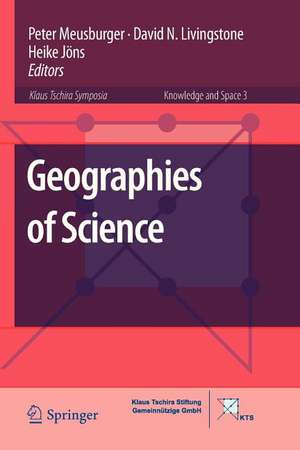Geographies of Science: Knowledge and Space, cartea 3
Editat de Peter Meusburger, David Livingstone, Heike Jönsen Limba Engleză Paperback – 5 sep 2012
The Klaus Tschira Foundation supports diverse symposia, the essence of which is published in this Springer series (www.kts.villa-bosch.de).
| Toate formatele și edițiile | Preț | Express |
|---|---|---|
| Paperback (1) | 943.88 lei 6-8 săpt. | |
| SPRINGER NETHERLANDS – 5 sep 2012 | 943.88 lei 6-8 săpt. | |
| Hardback (1) | 950.03 lei 6-8 săpt. | |
| SPRINGER NETHERLANDS – 3 iun 2010 | 950.03 lei 6-8 săpt. |
Din seria Knowledge and Space
-
 Preț: 401.57 lei
Preț: 401.57 lei -
 Preț: 431.94 lei
Preț: 431.94 lei -
 Preț: 281.52 lei
Preț: 281.52 lei -
 Preț: 181.58 lei
Preț: 181.58 lei -
 Preț: 293.36 lei
Preț: 293.36 lei -
 Preț: 295.37 lei
Preț: 295.37 lei -
 Preț: 402.38 lei
Preț: 402.38 lei - 18%
 Preț: 1383.49 lei
Preț: 1383.49 lei -
 Preț: 394.44 lei
Preț: 394.44 lei -
 Preț: 431.73 lei
Preț: 431.73 lei -
 Preț: 376.24 lei
Preț: 376.24 lei -
 Preț: 396.53 lei
Preț: 396.53 lei - 18%
 Preț: 1114.52 lei
Preț: 1114.52 lei - 18%
 Preț: 949.10 lei
Preț: 949.10 lei - 18%
 Preț: 950.66 lei
Preț: 950.66 lei - 15%
 Preț: 644.95 lei
Preț: 644.95 lei - 15%
 Preț: 649.87 lei
Preț: 649.87 lei -
 Preț: 429.61 lei
Preț: 429.61 lei -
 Preț: 92.91 lei
Preț: 92.91 lei
Preț: 943.88 lei
Preț vechi: 1151.07 lei
-18% Nou
Puncte Express: 1416
Preț estimativ în valută:
180.61€ • 188.57$ • 149.48£
180.61€ • 188.57$ • 149.48£
Carte tipărită la comandă
Livrare economică 04-18 aprilie
Preluare comenzi: 021 569.72.76
Specificații
ISBN-13: 9789400732261
ISBN-10: 9400732260
Pagini: 284
Ilustrații: XVII, 250 p.
Dimensiuni: 155 x 235 x 15 mm
Greutate: 0.4 kg
Ediția:2010
Editura: SPRINGER NETHERLANDS
Colecția Springer
Seria Knowledge and Space
Locul publicării:Dordrecht, Netherlands
ISBN-10: 9400732260
Pagini: 284
Ilustrații: XVII, 250 p.
Dimensiuni: 155 x 235 x 15 mm
Greutate: 0.4 kg
Ediția:2010
Editura: SPRINGER NETHERLANDS
Colecția Springer
Seria Knowledge and Space
Locul publicării:Dordrecht, Netherlands
Public țintă
ResearchCuprins
Comparative Approaches.- Landscapes of Knowledge.- Global Knowledge?.- Mobilities and Centers.- A Geohistorical Study of “The Rise of Modern Science”: Mapping Scientific Practice Through Urban Networks, 1500–1900.- From Mediocrity and Existential Crisis to Scientific Excellence: Heidelberg University Between 1803 and 1932.- Academic Travel from Cambridge University and the Formation of Centers of Knowledge, 1885–1954.- Designing Knowledge Spaces.- Big Sciences, Open Networks, and Global Collecting in Early Museums.- Is the Atrium More Important than the Lab? Designer Buildings for New Cultures of Creativity.- Outer Space of Science: A Video Ethnography of Reagency in Ghana.- The Making of Geographies of Knowledge at World’s Fairs: Morocco at Expo 2000 in Hanover.- Science and the Public.- Geographies of Science and Public Understanding? Exploring the Reception of the British Association for the Advancement of Science in Britain and in Ireland, c.1845–1939.- Testing Times: Experimental Counter-Conduct in Interwar Germany.- NGOs, the Science-Lay Dichotomy, and Hybrid Spaces of Environmental Knowledge.- Regulatory Science and Risk Assessment in Indian Country: Taking Tribal Publics into Account.
Textul de pe ultima copertă
This collection of essays aims to further the understanding of historical and contemporary geographies of science. It offers a fresh perspective on comparative approaches to scientific knowledge and practice as pursued by geographers, sociologists, anthropologists, and historians of science. The authors explore the formation and changing geographies of scientific centers from the sixteenth to the twentieth centuries and critically discuss the designing of knowledge spaces in early museums, in modern laboratories, at world fairs, and in the periphery of contemporary science. They also analyze the interactions between science and the public in Victorian Britain, interwar Germany, and recent environmental policy debates. The book provides a genuine geographical perspective on the production and dissemination of knowledge and will thus be an important point of reference for those interested in the spatial relations of science and associated fields.
The Klaus Tschira Foundation supports diverse symposia, the essence of which is published in this Springer series (www.kts.villa-bosch.de).
The Klaus Tschira Foundation supports diverse symposia, the essence of which is published in this Springer series (www.kts.villa-bosch.de).
Caracteristici
Highlights the spatial and temporal complexity and contingency of past, present, and future interdisciplinary geographies of science Presents a balance of historical and contemporary case studies
















